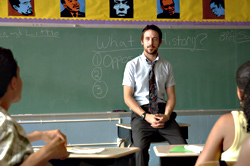A movie about a guy falling to pieces, Half Nelson sometimes resembles its hero, Dan Dunne (Ryan Gosling), an eighth-grade public schoolteacher in Brooklyn. Like Dan, the movie earns your respect and affection despite its rough patches. Dan is a crackhead, equally excessive with booze, cigs, and other drugs. Hardly a role model for kids, in other words, though he keeps his double life hidden from them. At first. Yet Dan’s excessiveness works wonderfully well in the classroom. At first. He’s the opposite of the dumbed-down, lowered-standards curriculum, instead trying to pack his pupils’ brains with everything he knows. Though they were born in the ’90s, his lessons are pure ’60s—assigning presentations on Che and Attica and Salvador Allende and Martin Luther King. (Filmmakers Ryan Fleck and Anna Boden supply us with newsreels of these historical figures and events; it’s too didactic, but so is Dan.) He’s a Hegelian, teaching dialectics via an arm-wrestling contest—again, not so subtle (like the movie), but his students understand.
Only one, 13-year-old Drey (Shareeka Epps), eyes him a little more suspiciously than the rest. She’s not so easily swayed. She has the look of a girl who’s been disappointed by adults (she lives alone with her mother, her older brother in jail), who knows a crack pipe when she sees one. Then, inevitably, once she sees her teacher with that pipe, once she finds him huddled sick in a bathroom stall after coaching her basketball practice, the movie’s conflict becomes whether she should bust him on it. Does he deserve a second chance? Does her brother, who took the fall for the neighborhood dealer (also Dan’s dealer)? Does anyone?
“If you can change one person . . . ,” Dan begins, then lets the thought trail away like so much smoke. He’s talking to his ex, who left the pipe and went into rehab. He loves the idea of reform, because he’s a man of ideas, his slovenly apartment filled with college philosophy books and old LPs, his cat the only thing requiring more care than occasional dusting (not that he does that either). But he loves the reality of drugs more. Thesis: change is possible. Antithesis: addiction is powerful. Hence the movie’s half- nelson synthesis: Dan, like a lot of people, lives within two incompatible systems. One day he’s cleaning his apartment and jogging; the next he’s back in the bars, high and carousing. A dinner date with a colleague (Monique Curnen) suggests a possible new relationship, then he drunkenly misbehaves with her.
AT SUNDANCE and SIFF this spring, everyone was raving about Gosling’s performance. For good reason—it’s the best I’ve seen this year, avoiding every junkie cliché and mannerism. He shows all the intelligence of a guy fully aware of his destructive habits, his better self still lingering like the half-erased lessons on yesterday’s blackboard. He’s not the stereotypical addict who charms to make his next score; he’s charming his students for entirely altruistic reasons. Dan understands that a good teacher must be a good performer (to prepare, Gosling shadowed a real Brooklyn teacher in the classroom, who turns up later in the film as his brother). Which is why his late-film collapse—Dan the actor forgetting his lines, his role, the whole edifying act—is so distressing for Drey and for us. So she sets out to help her teacher, spying on him and shaming him toward sobriety.
Though his is the showier role, Gosling is equaled by Epps (16 at the time of filming, in a part she previously played in Fleck and Boden’s prior short). Very much the non-pro, she should be giving Hollywood veterans $200 per hour lessons in how to underact. She makes Drey both wiser than her age (the eyes) and a little younger (the lollipop in her mouth). And since her mother works all the time, this split—dialectics! dialectics!—gives her a choice of two surrogate father figures: Dan, who needs her help like an injured puppy and therefore makes her feel older and more responsible; and Frank (the excellent Anthony Mackie), the local drug dealer, who’s kind, considerate, and fatherly—just what a little girl wants. It’s no surprise that Drey should prove the industrious and reliable drug courier to please Frank as Dan becomes more alarmingly unstable. Gangster Frank is there for Drey; teacher Dan is not.
This symbolism is a little too obvious, what with all Dan’s lectures about “turning points” that changed the tide of history. The ironies—teacher, teach thyself!—aren’t much more subtle. Yet in every case the actors invest these smaller turning points with entirely plausible ambiguity. A man who lives in a pointedly tidy house, Frank isn’t just playing nice—he’s genuinely concerned about Drey’s welfare, he owes a debt to her incarcerated brother, and that can’t be separated from his business methods. When Dan tries to confront him, this remarkable scene plays contrary to all expectation—a feinting, ducking rhetorical fistfight between two uncertain yet reasonable men.
There can be no neat resolution to their dispute, any more than Dan can be bothered to clean his apartment or feed his cat. Likewise, Half Nelson is haphazardly structured, not a precise logical argument. Some might maintain that Dan’s pathologies are symbolic of the feeble political left, or that a visit to his hard-drinking family is an indictment of pickled old boomer values. Fleck and Boden make no such social policy equation. To simply lay out the unruly terms of this debate is sufficient. And to turn statistics and headlines into such genuine characters makes Half Nelson utterly necessary.








